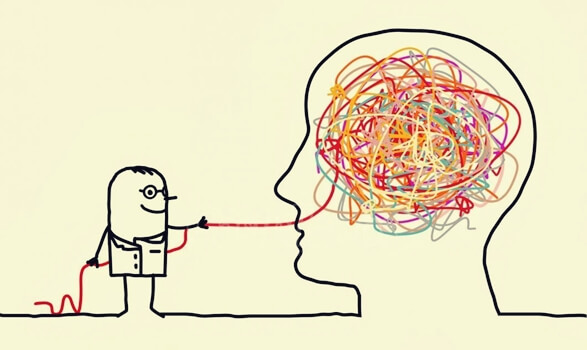10 Reasons to Study Psychology


Written and verified by the psychologist Valeria Sabater
We could give you a thousand reasons why we think it’s worth studying Psychology. However, there is one that sums them all up – it’s exciting! Few disciplines go beyond mere professional development and enrich us as people, allowing us to grow and have a much broader vision of our reality. Although it’s not an easy subject to study, it is an adventure that is definitely worthwhile.
When you attend your first class at university and find out what a wide range of subjects make up the Psychology degree, you might ask yourself whether or not you have made the right choice in studying Psychology. You might experience quite a shock when you have dozens of books to read, all with different theories and approaches that you have to understand and know how to differentiate.
“You are what you do, not what you say you will do”
-C.G. Jung
Some people feel tension and even despair when they come face to face with the always complex, but interesting, world of statistics, and of experimental designs. A world in which mathematics is still necessary – bad news for those who have bad memories of this particular subject. However, it is the daily work, and contact with each of the fields that make up this science which finally awakens us to its fascinating universe and helps to set us on our way.
On the other hand, it’s fair to say that that studying psychology will hardly make us rich or even guarantee us a job right after finishing the degree. The current society and labor market conditions are what they are, and sometimes we have to combine talent with ingenuity, motivation with opportunity, and persistence with patience. However, it must also be said that there are so many facets to branch out into, and that if we choose a good specialization we can build a rich and exceptional professional future.

10 reasons to study Psychology
Whether we are at that decisive moment of our life when we have to choose what we would like to work in, or if we think it’s time for change and to learn something different, studying Psychology will always be a good option. Everybody should, of course, reflect on two important points: what they are looking for and what they would like to offer to others. Psychology is a subject in which we can grow while we train, in order to offer the best of ourselves for the benefit of others. Let’s now see what advantages the degree in Psychology can offer us.
1. Psychology helps us understand ourselves better
As we go deeper into all of the above theories, the different approaches to the personality, human development or how culture impacts on our behavior, we are forced to look at our own lives and other people’s too.
Studying Psychology will make us ask ourselves many questions. Questions that don’t always have an answer. But ones that will help us to constantly search and discover. It will be an adventure where we get to know ourselves and other people a little more each day, and where we can leave behind certain attitudes and ideas that used to be so important for us.
2. We will learn to value scientific methods
Psychology is not magic. We are not mentalists nor do we have a radar in our mind that allows us to capture in 5 seconds what trauma the person in front of us is suffering from, what they-re afraid of, or what their strengths are. We will also almost certainly be accused by friends, relatives or acquaintances of “analyzing them”.
Psychology, as we know, has many false myths associated with it, and we will have to confront them in many contexts, whether we like it or not. However, there is one aspect that we must be clear about from the word go –Psychology is a social science that is based on scientific method.
We need to understand that in order to reach certain conclusions, certain data and insights, we must go through much laborious, objective and patient work. This work is always based on a series of research methods, and this is the way to be successful as a Psychology professional. On the other side is “pop psychology” that the general public loves so much, and that we see daily in magazines or social networks. This however has little or nothing to do with reality.

3. You will develop critical thinking
Much of the material, the theories, approaches and areas that make up Psychology studies help us to develop critical thinking. Whether we like it or not, it is an essential requirement if we want to be good professionals, and if we really want to be useful to people without losing our integrity and honor. Only then will we differentiate the wood from the trees, the lucidity of deceit, the reality of manipulation.
“Never think you know everything. As high as you may value yourself, always have the courage to tell yourself: I am ignorant “
-Ivan Pavlov-
4. Greater understanding of human relationships
Studying psychology will not convert us spontaneously into psychologically healthier, more successful or happier people (at least not the majority). Psychologists also suffer from depression and anxiety. They are not immune to failures in their emotional relationships and even have their small phobias and limitations.
However, having all this knowledge makes them much more aware of what is happening to them, and around them. It makes them understand relational dynamics much better. It helps them know when to ask for help regarding how to best help themselves or other people.
5. You will appreciate human development in its stages
Understanding how we develop, and how we as people change throughout our lives doesn’t only give us valuable knowledge. As a rule, it also makes us more sensitive and open to the problems of others and to their suffering or doubts also.
There is also the fact that Psychology reveals particularities associated with certain stages of our development, such as childhood or old age. We may also become passionate about those stages of life, and decide to devote our time to a particular group.
6. You will develop a new perspective on mental illness
Studying psychology will allow you to tear down many of the myths that people believe about mental illness. You will understand, for example, the differences between what is a syndrome, a disorder and a disease. You will realize that medication doesn’t cure certain diseases, it only “treats” them. You will discover for yourself the complexity of making a diagnosis, and the multiple nuances that there are in a depression, an anxiety disorder or a schizophrenia.

7. There is a speciality for every passion
Not all psychologists are psychoanalysts or follow Freud’s principles. Moreover, there are many more who don’t follow them than those who do. Not all practice hypnosis or have clinics. Studying psychology offers us the opportunity to train later on in a wide range of specialities, so that we can choose which one we like best. The options are many:
- Clinical psychology
- Educational psychology
- Sports psychology
- Forensic psychology
- Health psychology
- Organizational psychology
- Child and adolescent psychology
- Social or community psychology
8. Psychology – a perfect complement to other disciplines
Not many areas of study complement other disciplines as much as Psychology does. We can have, for example, a degree in journalism, medicine, nursing, pharmacy, philology, anthropology, art or economics and at the same time decide to start a degree in Psychology in order to acquire a much richer and more complete training, and a fascinating one at the same time.
“Even when it is not completely achievable, we become better at trying to pursue a higher goal”
-Viktor Frankl-
Much more than having a good curriculum, studying Psychology enriches us by understanding human behavior much better, with all its social interaction, language, communication, motivation, emotions, and decision making. These processes are often essential in order to have a more complete vision of the other sciences.
9. You will learn to communicate much better
This is an aspect that we don’t always talk about. However, something that the student of psychology discovers in their day to day studies, is that acquiring skills in the management of emotions or by understanding body language much more together with all its nuances actually gives them a greater ability in interpersonal communication.
We’re not only talking about improving our ability to speak in public, but also how we’ll start to communicate better with our people. We’ll understand the person in front of us through their non-verbal communication, their tone of voice and expressions, and we’ll be able to have a more empathetic and effective dialogue with them.

10. Studying Psychology can be the first step towards the best stage of your life
We said at the beginning that we could give you 1000 reasons to study Psychology, but there is one that transcends all others – it is a fascinating science and it can open us a whole new stage in our life. We will always find something that in a given moment, touches us in such a way that we say to ourselves “this is me”, this is what I want to go deeper into, this is the area I want to help people in.
On some occasions it will be neuroscience and all its mysteries. In other cases it’ll be a certain type of therapy. Sometimes it is the desire to help children or to focus on a more experimental area of research. The world of Psychology is so extensive that everyone, at some point, will find what specific aspect they want to work in. And it is in that instant that everything changes and everything acquires meaning.
So, if you are considering the possibility of studying Psychology, we would like to encourage you to undertake this amazing adventure that hardly ever disappoints.
Bibliographical references
Triglia, A, Regader, Bertrand, and García-Allen Jonnatahn, (2016). Psychologically speaking.
Paidós.Sheena Iyengar, (2006). The Art of Choosing. Psychology Press.
Pink, Daniel (2010). The amazing truth about what motivates us. Management 2000.
Butler-Bowdon, Tom (2004). 50 Psychology Classics: Who We Are, How We Think, What We Do: Insight and Inspiration from 50 Key Books. New York: H. Books.
We could give you a thousand reasons why we think it’s worth studying Psychology. However, there is one that sums them all up – it’s exciting! Few disciplines go beyond mere professional development and enrich us as people, allowing us to grow and have a much broader vision of our reality. Although it’s not an easy subject to study, it is an adventure that is definitely worthwhile.
When you attend your first class at university and find out what a wide range of subjects make up the Psychology degree, you might ask yourself whether or not you have made the right choice in studying Psychology. You might experience quite a shock when you have dozens of books to read, all with different theories and approaches that you have to understand and know how to differentiate.
“You are what you do, not what you say you will do”
-C.G. Jung
Some people feel tension and even despair when they come face to face with the always complex, but interesting, world of statistics, and of experimental designs. A world in which mathematics is still necessary – bad news for those who have bad memories of this particular subject. However, it is the daily work, and contact with each of the fields that make up this science which finally awakens us to its fascinating universe and helps to set us on our way.
On the other hand, it’s fair to say that that studying psychology will hardly make us rich or even guarantee us a job right after finishing the degree. The current society and labor market conditions are what they are, and sometimes we have to combine talent with ingenuity, motivation with opportunity, and persistence with patience. However, it must also be said that there are so many facets to branch out into, and that if we choose a good specialization we can build a rich and exceptional professional future.

10 reasons to study Psychology
Whether we are at that decisive moment of our life when we have to choose what we would like to work in, or if we think it’s time for change and to learn something different, studying Psychology will always be a good option. Everybody should, of course, reflect on two important points: what they are looking for and what they would like to offer to others. Psychology is a subject in which we can grow while we train, in order to offer the best of ourselves for the benefit of others. Let’s now see what advantages the degree in Psychology can offer us.
1. Psychology helps us understand ourselves better
As we go deeper into all of the above theories, the different approaches to the personality, human development or how culture impacts on our behavior, we are forced to look at our own lives and other people’s too.
Studying Psychology will make us ask ourselves many questions. Questions that don’t always have an answer. But ones that will help us to constantly search and discover. It will be an adventure where we get to know ourselves and other people a little more each day, and where we can leave behind certain attitudes and ideas that used to be so important for us.
2. We will learn to value scientific methods
Psychology is not magic. We are not mentalists nor do we have a radar in our mind that allows us to capture in 5 seconds what trauma the person in front of us is suffering from, what they-re afraid of, or what their strengths are. We will also almost certainly be accused by friends, relatives or acquaintances of “analyzing them”.
Psychology, as we know, has many false myths associated with it, and we will have to confront them in many contexts, whether we like it or not. However, there is one aspect that we must be clear about from the word go –Psychology is a social science that is based on scientific method.
We need to understand that in order to reach certain conclusions, certain data and insights, we must go through much laborious, objective and patient work. This work is always based on a series of research methods, and this is the way to be successful as a Psychology professional. On the other side is “pop psychology” that the general public loves so much, and that we see daily in magazines or social networks. This however has little or nothing to do with reality.

3. You will develop critical thinking
Much of the material, the theories, approaches and areas that make up Psychology studies help us to develop critical thinking. Whether we like it or not, it is an essential requirement if we want to be good professionals, and if we really want to be useful to people without losing our integrity and honor. Only then will we differentiate the wood from the trees, the lucidity of deceit, the reality of manipulation.
“Never think you know everything. As high as you may value yourself, always have the courage to tell yourself: I am ignorant “
-Ivan Pavlov-
4. Greater understanding of human relationships
Studying psychology will not convert us spontaneously into psychologically healthier, more successful or happier people (at least not the majority). Psychologists also suffer from depression and anxiety. They are not immune to failures in their emotional relationships and even have their small phobias and limitations.
However, having all this knowledge makes them much more aware of what is happening to them, and around them. It makes them understand relational dynamics much better. It helps them know when to ask for help regarding how to best help themselves or other people.
5. You will appreciate human development in its stages
Understanding how we develop, and how we as people change throughout our lives doesn’t only give us valuable knowledge. As a rule, it also makes us more sensitive and open to the problems of others and to their suffering or doubts also.
There is also the fact that Psychology reveals particularities associated with certain stages of our development, such as childhood or old age. We may also become passionate about those stages of life, and decide to devote our time to a particular group.
6. You will develop a new perspective on mental illness
Studying psychology will allow you to tear down many of the myths that people believe about mental illness. You will understand, for example, the differences between what is a syndrome, a disorder and a disease. You will realize that medication doesn’t cure certain diseases, it only “treats” them. You will discover for yourself the complexity of making a diagnosis, and the multiple nuances that there are in a depression, an anxiety disorder or a schizophrenia.

7. There is a speciality for every passion
Not all psychologists are psychoanalysts or follow Freud’s principles. Moreover, there are many more who don’t follow them than those who do. Not all practice hypnosis or have clinics. Studying psychology offers us the opportunity to train later on in a wide range of specialities, so that we can choose which one we like best. The options are many:
- Clinical psychology
- Educational psychology
- Sports psychology
- Forensic psychology
- Health psychology
- Organizational psychology
- Child and adolescent psychology
- Social or community psychology
8. Psychology – a perfect complement to other disciplines
Not many areas of study complement other disciplines as much as Psychology does. We can have, for example, a degree in journalism, medicine, nursing, pharmacy, philology, anthropology, art or economics and at the same time decide to start a degree in Psychology in order to acquire a much richer and more complete training, and a fascinating one at the same time.
“Even when it is not completely achievable, we become better at trying to pursue a higher goal”
-Viktor Frankl-
Much more than having a good curriculum, studying Psychology enriches us by understanding human behavior much better, with all its social interaction, language, communication, motivation, emotions, and decision making. These processes are often essential in order to have a more complete vision of the other sciences.
9. You will learn to communicate much better
This is an aspect that we don’t always talk about. However, something that the student of psychology discovers in their day to day studies, is that acquiring skills in the management of emotions or by understanding body language much more together with all its nuances actually gives them a greater ability in interpersonal communication.
We’re not only talking about improving our ability to speak in public, but also how we’ll start to communicate better with our people. We’ll understand the person in front of us through their non-verbal communication, their tone of voice and expressions, and we’ll be able to have a more empathetic and effective dialogue with them.

10. Studying Psychology can be the first step towards the best stage of your life
We said at the beginning that we could give you 1000 reasons to study Psychology, but there is one that transcends all others – it is a fascinating science and it can open us a whole new stage in our life. We will always find something that in a given moment, touches us in such a way that we say to ourselves “this is me”, this is what I want to go deeper into, this is the area I want to help people in.
On some occasions it will be neuroscience and all its mysteries. In other cases it’ll be a certain type of therapy. Sometimes it is the desire to help children or to focus on a more experimental area of research. The world of Psychology is so extensive that everyone, at some point, will find what specific aspect they want to work in. And it is in that instant that everything changes and everything acquires meaning.
So, if you are considering the possibility of studying Psychology, we would like to encourage you to undertake this amazing adventure that hardly ever disappoints.
Bibliographical references
Triglia, A, Regader, Bertrand, and García-Allen Jonnatahn, (2016). Psychologically speaking.
Paidós.Sheena Iyengar, (2006). The Art of Choosing. Psychology Press.
Pink, Daniel (2010). The amazing truth about what motivates us. Management 2000.
Butler-Bowdon, Tom (2004). 50 Psychology Classics: Who We Are, How We Think, What We Do: Insight and Inspiration from 50 Key Books. New York: H. Books.
This text is provided for informational purposes only and does not replace consultation with a professional. If in doubt, consult your specialist.







